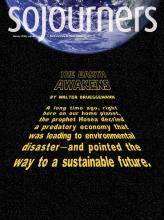MICHAEL FASSBENDER'S uncanny performance as Apple Inc. co-founder and CEO Steve Jobs begs the question of how someone so clueless about human relationships could win the hearts of so many people. Of course, the performance and the Aaron Sorkin script it’s based on are not the same thing as the man himself. Steve Jobs may be unfairly treated by Steve Jobs. The question of its accuracy is not unimportant, and people who knew him deserve a hearing. But the film only sketches a persona rather than providing an encyclopedia of the soul.
Treating Steve Jobs as a film about power and personality evokes the Quaker teacher Parker Palmer’s notion of an “undivided” life. Palmer quotes Rumi’s warning, “If you are here unfaithfully with us, you’re causing terrible damage.” One facet of this unfaithfulness is the difference between living “from the inside out” and living primarily for external reward. Undivided lives are punctuated by initiatory experience, familiar to our ancestors, and now re-emerging in communities such as the ManKind Project and Woman Within. Initiatory experiences take people into the depth of their psyches, supported by wise elders, opening a crack that lets in the light of transformation. Initiated egos thrive in balanced service to the highest self and the common good (so the wise elders tell me).
The Steve Jobs in Steve Jobs has no such initiation—he seems basically the same shallow egotist at the end of the movie as he was at the start. The joy of Steve Jobs is the kinetic dance of image and sound, and actors at the top of their game (Kate Winslet as the definition of long-suffering colleague, Seth Rogen in a rare dramatic role, and Michael Stuhlbarg, all of them representing prickly conscience). The problem of Steve Jobs is that it omits engagement with the personal transformation that many think unfolded for him as his products achieved something like omnipresence. There’s no initiation here, unlike in Bridge of Spies, where Tom Hanks risks his life to negotiate a prisoner swap in a gripping, if light, Cold War thriller. Mark Rylance’s accused Soviet spy emerges more humanized than Jobs’ community-building entrepreneur.
Read the Full Article

